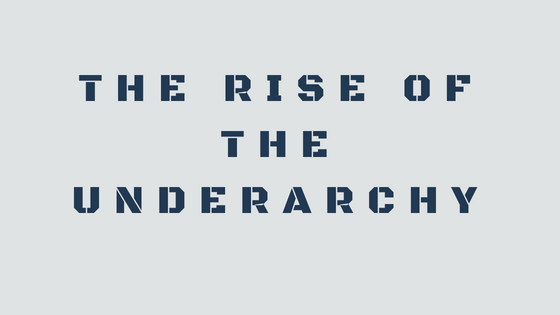It is part of the common human experience to feel rejected, to feel on the outside, to feel as if we don’t belong. Even, Jesus, the God-man had a very poignant experience of the rejection of people, even his closest friends and relatives. When we feel rejected, it becomes common to seek out others who understand our pain. We don’t want friends like Job who just say, “Get it together, man! There must be some hidden sin in you, which is why you are suffering so much.” No, in those moments of fierce rejection, we tend to find misfit companions just like us. Like the young David, running from his father in law, King Saul…who should come to him, but the outcast, dissatisfied and disenfranchised young men of his day. The knew that David could identify with their pain and so they ran to him. They fought for him. They were willing to risk their lives for him. It is natural and human to want to band together according to the common experiences of rejection that we share.
But there is something that concerns me about the way modern society is choosing to band together. There has been much said in recent days about the merits and woes of what we have come to label “identity politics.” It’s this idea that we tend to frame our political conversations around the groups that we identify with. Most of these groups are characterized by their felt levels of disenfranchisement by mainstream culture. Examples of such groups can include: women, minority groups, LGBTQ individuals, etc. Because many people in these groups have felt rejected by the rest of society for different reasons, they feel that their identification with these groups gives them an authority in the conversation that others do not have. To a large extent, that is true. It’s hard to talk about a social experience that is not your own. Your group identity, especially if you appear noticeably different from your peers, gives you a unique voice.
However, there is a subtle danger here that can shut down conversation and it can shut down the process of moving us in a positive and unifying direction as a culture. “Intersectionality” has been introduced as a fairly new concept on college campuses, though it was first coined in the 1980s. It describes the layers of societal barriers that arise when someone belongs to more than one of these disenfranchised groups. For example, a black American woman would presumably have more to contend with as far as barriers to her success than a white American woman. I understand the logic behind this concept completely. We are trying to figure out and grapple with what makes some people lag behind and other people more successful. We are trying to even the playing field as much as possible, which is very noble of us.
The problem comes when we begin to view “The Hierarchy” as an inherent problem— that people in power, only by virtue of their power, are inherently the problem. Instead of having the burden of pointing out the specific ways in which the hierarchy has been a problem, we jump to the conclusion that the hierarchy is a problem just because they exist. Many people have risen to the higher ranks of society, not because they were a problem, but because they are actively solving problems. If we have no hierarchy at all, we have no values, we have nothing to do, and nothing to strive for— no goals to improve our current state of being.
We know that the problems of the hierarchy will always be something we need to guard against. We know that the human experience of absolute power has the risk of corruption, which is why we need to be watchful of people in power and to hold them accountable. At the same time, I see an equally suspicious class pop up, and that is what I’ll call the rise of the Underarchy. I am giving this group a name because we cannot notice something we do not name.
The Underarchy are the people who so identify with the disenfranchisement of the groups to which they belong, that they wear their under-privilege as a badge of honor. The more stamps they can get on their “underprivileged” card the more a sense of entitlement they feel. They use the word “privilege” as a byword to eliminate people from a conversation that they don’t want to engage in.
There is something very dangerous about over-identifying yourself by your negative experiences alone. It causes your senses to become heightened to the negative experiences around you and you begin living a negative and learned helpless existence. You subtly begin to assume that only people who belong to your disenfranchised group can really understand you. It is very seductive because the wounds we have really do hurt, and the last thing we want to do is to open ourselves up again to someone who identifies with a group that corresponds with the last person who hurt us. It can be a real struggle.
But in fact, history tells us the danger that this kind of thinking can lead to. In fact, it was the marked success of the Jews that were rising to the economic and academic hierarchy in Germany that first led the Germans to a feeling of jealousy, of rejection, and of disenfranchisement. They felt that in order to feel safe as “true Germans,” they had to push the power of their choice identity: white nationalism—something that the Jews could not fully claim.
You know that you are in dangerous territory when you begin using your identity group to silence another person in a conversation, when you believe that your identity card allows you to play by different rules of morality and conduct.
These days, those who have more points of “intersectionality” or who have more points in the Underarchy can say things that those who have zero points, namely the white straight male, cannot. When this begins happening in a society, it is a sign that we are getting away from the whole “all men (and women) are created equal” thing. It means that we’ve unknowingly shifted the pendulum too far the other way. The Hierarchy can be corrupted for sure, but the Underarchy can be just as corrupt and can cause damage as well. Maybe the playing cards of the hierarchy are most often money, power, and professional opportunity, but the Underarchy can deal in social and political threat and can even incite violence.
If you do find that you afford the “intersectionality points” because of the person you happen to be, realize you too have power and you too have influence. Please use your influence wisely and lovingly. Do not be deceived into thinking that you get to live by a different moral standard than others. Do not attempt to climb the ranks of the Underarchy so you can hold it over people’s heads. Do not use your group identity to silence, belittle, or to dismiss anyone who does not share that identity. If you do, you will become part of the problem you hoped to solve. All I ask is that you please, identify responsibly.

